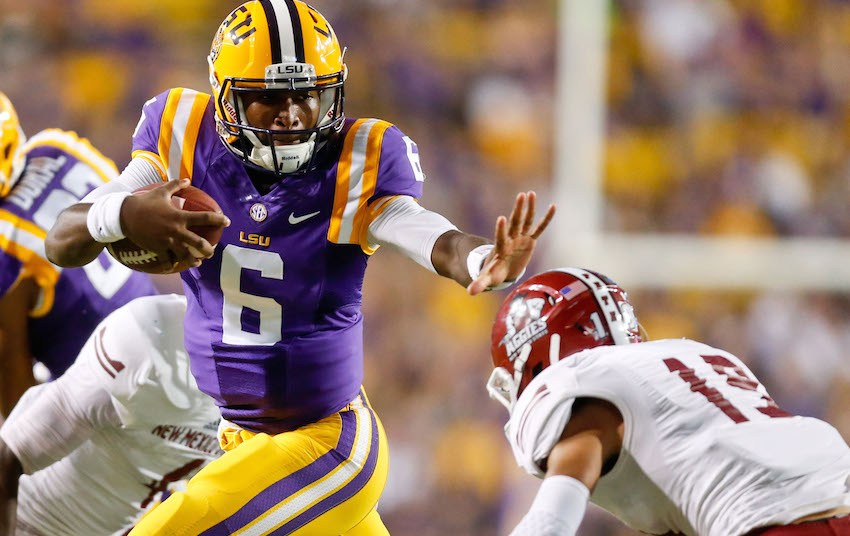
Lost in the Fournette hype, Brandon Harris looks much improved
Two weeks ago, the spotlight shined brightly on LSU quarterback Brandon Harris as he prepared to make his first SEC start of the season against then-No. 25 Mississippi State.
Since then, the attention has shifted onto his backfield counterpart Leonard Fournette, who’s taken the nation by storm with 387 rushing yards and six touchdowns to put himself in the thick of the Heisman Trophy race.
But lost in the Heisman conversation of No. 8 LSU’s 2-0 start is the fact that Harris has played surprisingly well through the early part of the team’s schedule. He may be flying under the radar, but perhaps that’s precisely what he wants at this point in the year.
Harris has completed 21 of 31 pass attempts for one touchdown and no interceptions. He has completed almost 68 percent of his passes and boasts a 117.7 efficiency rating.
Fournette may be far and away LSU’s leading rusher this season, but Harris sits right behind at No. 2. Harris has amassed 114 yards on the ground on 13 attempts, which is good for an average of 57 yards per game, and he’s ran for a pair of touchdowns.
There is no denying what Harris is — a game manager — and that isn’t meant to be a pejorative label. But LSU ranks fifth in the nation in rushing yards per game (338.5). With a stout rushing attack and an imposing defense, there’s no need for Harris to be attempting 30-plus passes per game.
The 15, 16 or so pass attempts per game is more than enough to manage game situations and ensure Fournette and the rest of the LSU running backs are getting enough touches to control the game. It’s also giving LSU an edge in time of possession, which allows the Tigers’ defense to get adequate rest on the sideline and go full throttle when need be, particularly in the third and fourth quarters.
Harris is not yet the polished passer that he may someday develop into. Instead, he’s using his physical gifts as a runner to be effective, and perhaps more importantly, protective of the football. LSU has converted 36 first downs this season, 25 of which have come via running plays. Harris alone has accounted for five of them, all via rushing attempts.
Through two games, Harris has yet to commit a single turnover. In fact, LSU is the lone team in the SEC (and one of only three in the FBS) without a turnover.
Harris has shown a better understanding of the offense, which is a testament to his offseason. Last season, we saw Harris’ physical tools on display in the comeback attempt against Mississippi State and in the win over New Mexico. That was all quickly forgotten when Harris drew the start against Auburn but looked lost when he had to truly orchestrate the offense.
At this point, being a game manager is all LSU needs the sophomore to be, and he’s excelled at it. Throughout the summer, players and coaches praised Harris for his understanding of the playbook and his execution.
Over the next five games, the team will look to Harris to continue in the role he’s carved out for himself and lead LSU effectively. Thus far, the formula has yielded exceptional results.
In that time, perhaps LSU’s quarterback will continue to see his confidence grow and his playmaking abilities evolve. It may be critical when the Tigers take on Alabama and Ole Miss when November hits.
For now, a game manager is what Harris has to be in order for LSU to sustain success.
